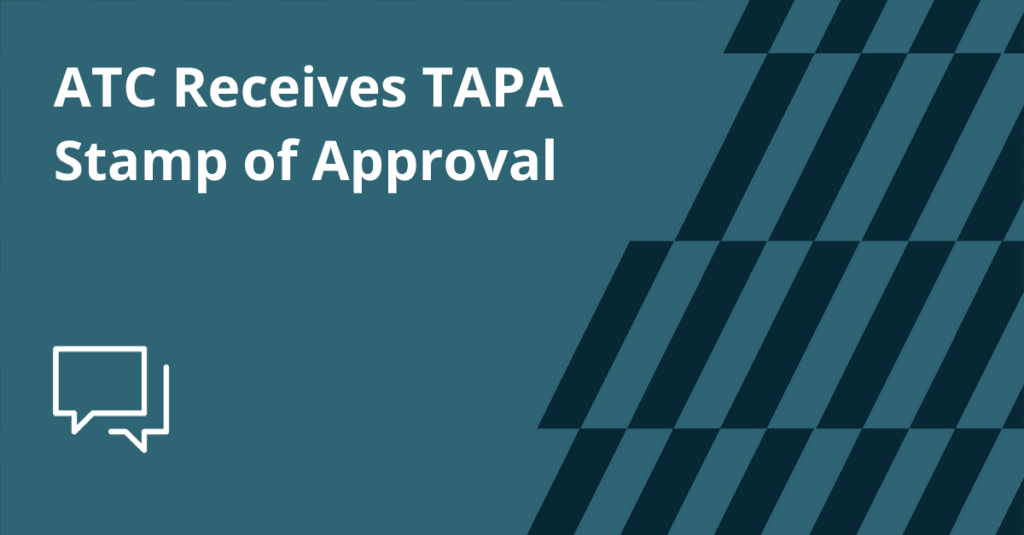
ATC is a member of the Transported Asset Protection Association (TAPA). This organisation is industry-led and focuses on supply chain security by developing and applying global security standards and recognised security practices.
Once again, we are delighted to announce that ATC has been assessed and re-certified as meeting the requirements of the TAPA TSR security requirements for the next three years.
In addition, after taking up occupancy of our newly built HQ in Baldonnell in August 2022, ATC has also been certified as meeting the requirements of the TAPA FSR security requirements for the next three years. This was a huge achievement for ATC, with plenty of team work from everyone.
Security processes are vital to running our business, particularly regarding the security of our people and our client’s assets in our care. We welcome the opportunity to be assessed by an industry body to measure the effectiveness of the procedures we have implemented within our trucks and warehouse facilities to ensure they meet and exceed the requirements.
TAPA themselves review their standards every three years, in consultation with association members, to ensure they are up to date with and have addressed emerging threats to the supply chain. For example, the security posture of the businesses for cybersecurity is an area that TAPA review as part of their audit.
TAPA’s mission “is to ensure the integrity and resilience of global supply chains, enabling sustainable supply chain risk management and loss prevention through the adoption of proven industry security standards, the gathering and sharing of threat and loss intelligence, training, networking, and collaboration with all stakeholders to ensure the secure movement and supply of goods for businesses and consumers.”
ATC was examined under two separate certifications:
Facility Security Requirements (FSR)
The FSR standard sets minimum standards for operating a secure warehouse facility.
During the FSR audit, the appointed auditor performs several steps to assess our operations comprehensively. To give you an idea of what is involved, they start by reviewing our procedures document for warehouse security and the security measures for getting in and out of the facility, e.g. key cards, logs, and security personnel.
They walk the parameters of the building, checking if adequate CCTV is in place to view all traffic coming into and out of the building, asking questions such as:
- Can the vehicles be seen clearly?
- Are there unauthorised vehicles parked in the loading area?
- Is the physical barrier the required standard of 6ft/1.8 meters high?
The next point of call is inside the building. The auditor will review everything from floor to ceiling, mainly looking for any gaps where security may be exposed and ensuring that anti-tamper measures, such as anti-ram barriers, are installed on the windows.
Other considerations include our cyber security protocols and if we have a power interruption mitigation plan in place with backup generators should there be a power outage.
Everything from the ground level to the rooftop is assessed to ensure it meets the standards agreed upon by industry members. There are pages of requirements that we won’t delve into here, but we hope this gives you an insight into the significance of gaining FSR approval.
Trucking Security Requirements (TSR)
The second accreditation we were examined for is the TSR standard. TSR is focused on the road transportation of products within the supply chain. According to TAPA, “over 90% of cargo losses report to the TAPA EMEA Intelligence System involve criminal attacks on vehicles.” Unfortunately, this is a growing global trend we highlighted in a blog last year entitled: “Reducing the Risk of Cargo Theft During Transport.”
The TSR guidelines aim to protect drivers, vehicles and assets by ensuring measures are in place to prevent criminal attacks.
Like the FSR audit, the auditor will want to see that a set of procedures and guidelines are in place for our transport security. They also expect to see an appointed person from the company overseeing the supply chain security and maintaining the TSR program. From there, the assessor will review delivery records to ensure the reporting is completed in full.
Our Transport Planners also have an essential role in the TSR accreditation as guidelines stipulate that companies like ATC are always expected to take the safest route available to minimise any stops being required in what is classified as high-risk areas due to traffic. They will also want to review the list of parking locations used across Europe to ensure that they are approved, as this is where many incidents can occur.
Of course, the auditor will also be looking at the physical security of the trucks and the tracking systems used by the company to ensure that they comply with industry standards.
These are just some examples of the process. Similar to the FSR, there are detailed requirements that we have to meet to ensure that we are eligible for certification.
We are delighted to hold this accreditation for another three years and want to take this opportunity to thank TAPA for their continued support.
We also thank our team for their dedication and continued hard work.
Ann Roe
Business Operations Manager


